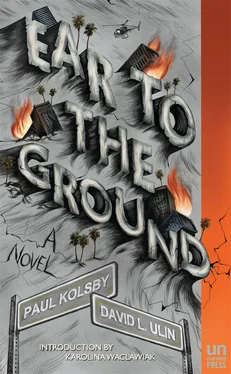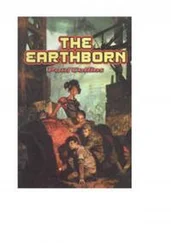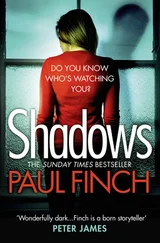He tried to work slowly, but he was falling behind. In an hour and nineteen minutes, an energy flow would trigger a spark that, unchecked, would sweep across the Pacific and detonate the San Andreas. Charlie couldn’t shake the feeling that things would not be ready in time.
By seven-fifty-one, however, he had finished packing the explosives around the detonator pins and connecting it all to a single fuse. The fuse ran to a digital timer, which — after checking his calculations — Charlie set. By flashlight, he made a final check of his wiring, then stood and admired his work. It was an amazing thing, if you thought about it, that science had brought him here.
Charlie picked up his rucksack and started to run. It was a mile from the jungle back to the harbor. Every few minutes, he checked his watch, but time had become a fluid entity, no longer reliable in any way he could understand. Seconds felt like minutes, minutes like hours. Just a few hours earlier, the reverse had been true, and he wondered if that were also the case in Los Angeles, where the remaining citizens were struggling to prepare for whatever might come their way.
The thought startled him, and he stopped. For the first time, he began to wonder why he had not gone public with the retroshock idea. Los Angeles had been so disrupted — abandoned and dispirited; perhaps and, certainly, hopefully, none of it had been necessary at all. He stood there in the brush, regret palpable on his skin. “Shit,” he said aloud. “I should have told them.” A moment later, the explosives blew.
The blast was like a blitzkrieg. It hit with a percussive thwap that rattled Charlie’s knees and a white burst of light that seared him to the spot. A second later, a hot wind came tearing through the jungle and knocked him to the ground. His head glanced off a piece of rock, and when he touched his brow, his fingers came away with blood.
Afterwards, the silence was the deepest Charlie had ever known. He tore a strip off his shirt and bandaged his head, then shouldered his pack and continued. The crystal on his watch was broken, and its hands had been fused into place by the heat. But Charlie knew he had done everything he could.
AND THE EARTH STOOD STILL
ON FRIDAY, DECEMBER 29, SEVENTEEN EARTHQUAKES disrupted the surface of the earth. The largest was a 3.3 that struck the Philippines, near Manila. In Los Angeles, the day looked like any other: hills standing in stark relief against valleys, ocean, and sky.
All afternoon, the city lay paralyzed by anticipation. People found themselves jumping at every rustle of wind, every barking dog, every creak and groan. As night began to fall, lights flickered in what few inhabited buildings remained, candles of faith against the darkness. It was like Christmas, but with utter lawlessness. An elderly man walking along La Cienega threw a brick through the front window of Ed Debevic’s. Hoodlums got inside the Bank of America at Sunset and Vine but couldn’t figure out where the money was.
In the parking lot outside the Center for Earthquake Studies, Sterling Caruthers sat on a temporary dais, before three hundred journalists, waiting for the ground to move. As the clock crept toward midnight, he found himself reverting to a childhood habit — prayer. Please, he thought, let it come now. And when nothing happened, he thought again: Now. Now. Now.
At twelve-oh-three a.m., Caruthers felt compelled to take the microphone. “The earth is an inconsistent conductor of seismic energy,” he said. “Our simulations of the past few days indicated we might be running late.”
“Why didn’t you tell us before?” somebody bellowed. Similar questions came from all around him.
Caruthers fired back. “Think this is a game ?” The crowd grew silent. “You think this is fun? This doom?” He slammed his fist against the podium, playing the outraged elder statesman. Actually, he had been hoping the quake would be delayed, knowing his power would increase exponentially until New Year’s. At that point, in the absence of seismic activity, he’d be run out of town on a rail.
From Honolulu, Charlie left a message on Grace’s machine — that everything had gone more or less as planned. Knowing he’d be unable to fly into L.A, he booked a flight to Phoenix instead and rented a car. He got home before midnight, and found a bottle of champagne in the fridge, a red rose, and a note:
Meeting going till late. See you after. You’re my hero, baby. XO (love) Grace.
The bed had been turned down and sprinkled with rose petals, and Charlie’s stomach fluttered at the thought of Grace being there while he was gone. He smelled her on his pillow, and the sense he got was one of home, of a life shared, complete. Her presence was like a bright light illuminating the empty corners of these rooms.
Charlie hopped in the shower. Ten minutes later, he was in his car, headed for CES. At twelve-twenty-nine a.m., he reached the parking lot and found thirty people standing in his space. News of Charlie’s presence rippled through the crowd. The reporters turned en masse and barraged him with questions.
“Charlie Richter, ladies and gentlemen,” Caruthers said, and reluctantly yielded the floor.
Charlie had saved the world, or at least part of the world. And he was in love. He knew, like few people ever know, that he’d reached the proverbial most important moment of his life. For a second, he saw white and heard in his mind’s ear a sort of cymbal crash. Then he swallowed, and gripped the sides of the podium tightly. “The earthquake we expected this evening … has been averted,” he mumbled, cotton-mouthed.
Before he had time to cough, the crowd went wild. Charlie cleared his throat and pulled a large sketchpad from his knapsack. “This is called a retroshock …”
Caruthers felt blood throbbing in his neck and suddenly wanted to be sick. “It isn’t coming,” Charlie continued, calmly. “The earthquake has been redirected. It’s nothing to worry about …”
People finally shut up when Maggie Murphy from the Los Angeles Reade r climbed atop a car and began screaming Charlie’s name.
“Dr. Richter! Are you asking us to believe you just stopped the earthquake?” She seemed to shimmer like an angel, her black hair shiny under the fluorescent lights.
“Yes,” Charlie said.
Then Murphy’s eyes narrowed, her voice grew tight, and she wasn’t an angel anymore. “You guys should be tarred and feathered,” she said.
Caruthers’s mind was whirling. He had only one option — to stand by Charlie. His genius. If the earthquake came, fine. If it didn’t, at least the retroshock would provide some sort of out.
He put his arms around Charlie’s shoulder, gave him a Hollywood hug, and leaned forward to speak. “We live in a world of science and hope for the future, where great—”
That was all he could get out before the crowd pressed in, sending both him and Charlie inside to the discredited halls of CES.
THE NUMBERS GAME, PART TWO
ETHAN CARSON’S HOUSE ON THE BEACH IN MALIBU HAD been decorated entirely in black, white, and gray. The idea, he’d been told by a designer, was to accentuate the people in the rooms. This made perfect sense, because Ethan entertained movie stars who were constantly in need of accentuation. Stockpiles of champagne lay in wait in the garage’s auxiliary refrigerator. Whether that champagne would be brought out at all, or bourbon served instead, was a matter of the numbers.
People began dropping by his monochrome palace before noon, as Ethan was busy making calls to theater chains, plugging the data into a computer program called “MOVIEGROSS.” By one o’clock, Henny Rarlin was on the veranda, already drunk. Ear to the Ground had made $37 million in its opening week, but it was uncertain whether the film would continue to do business — or, as the industry put it, “had legs.” If, in the second weekend, grosses dropped by more than half, they were in big trouble. But if they dropped by, say, a quarter, they were in business. Big business.
Читать дальше












